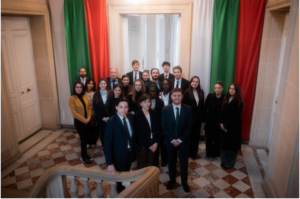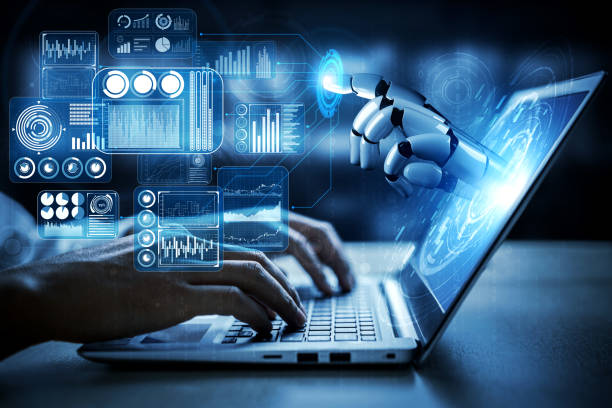The rise of artificial intelligence
Artificial intelligence (AI) is a set of theories and techniques aimed at creating machines capable of simulating human intelligence. Through machine learning, deep learning and the use of big data, AI is able to perceive, understand and act, thus opening up new possibilities for efficient problem solving.
The concept of artificial intelligence emerged in the mid-1950s, initiated by two students John McCarthy and Marvin Minsky. It emerged following the reflections of the British mathematician Alan Turing who, in his famous article « Computing Machinery and Intelligence », wondered whether a computer would ever be able to « think » or whether it was only capable of an « imitation game ». As the world faced the dizzying conundrum of whether computers would ever take over from humans, these two students sought to provide an answer.
The columnist Nicolas Vicheney later wrote: « For the time being, the most powerful computers are still immensely stupid – they can still only say yes and no, but several billion times a second… ».
During the 1960s, efforts focused on building intelligent machines, to mechanize thought processes based on logic and deduction. But these methods proved ineffective in solving problems such as perception or control. AI then went into a long period of ‘hibernation’. While little progress was visible for decades, on the eve of the 2000s, AI was revived with the arrival of powerful technologies.
Artificial intelligence, an asset or a disability?
Advances in artificial intelligence have greatly increased its use, transforming access to knowledge and the economy. Certain intellectual skills are becoming « mechanized » and losing their value. Being very present in companies, AI is completely rethinking the way of working, especially in administrative and legal functions. Other sectors, on the other hand, are being upgraded, keeping a clear advantage over machines, such as art, science or activities related to relations between people. Jobs in construction or maintenance that are difficult to replace are also being revalued.
While AI could replace up to 300 million jobs, or a quarter of all jobs in the United States and Europe, according to a report by the investment bank Goldman Sachs, it could also be beneficial in terms of productivity. A study published by PwC shows that it will be able to transform productivity and increase the GDP of the global economy by 26% by 2030.
A disturbing technological advance…?
In France, the issue of artificial intelligence is divisive. While 61% of citizens think that robots can improve the organisation of their company, 65% fear the negative consequences of this intelligence on their salary. However, France remains one of the countries that uses AI the least, with only 16% of French people working in an AI environment, compared to 31% in China.
Despite the high use of AI in China, there are some concerns, such as increased surveillance of the population by the national government or by major foreign powers. Therefore ChatGPT, a software that provides answers on various topics, has been banned in China. A measure also taken by the New York City authorities, who banned access to ChatGPT in their schools, fearing massive use of the application by students.
In France, the Institute of political Studies in Paris has also been banned from using the system. Sergei Guriev, director of teaching and research at Sciences Po Paris, said: « This tool, which uses artificial intelligence (AI), raises serious questions for education and research stakeholders worldwide about fraud in general and plagiarism ».
Italy has also put in place restrictions on the use of ChatGPT. The Italian data protection authority justified this decision by the protection of personal data, especially those of minors. The national authorities have also opened an investigation against the developer of ChatGPT, OpenAI. The investigation concerns possible violations of Italian data protection laws.
A committed Europe facing a « new risk «
For its part, Europe has been trying for almost two years to set limits on artificial intelligence. After the presentation of a draft regulation by the European Commission in April 2021, it is now the turn of the European Parliament to address the issue. A regulation on artificial intelligence, led by Romanian Dragos Tudorache and Italian Brando Benifei, has been unveiled. The regulation plans provide for the restriction of so-called « risky » systems, such as ChatGPT, or its new, even more powerful version, GPT-4.
With this measure, Europe is presenting itself as the guarantor of the security of its citizens’ data.
… but a major player on the international scene !
In recent years, artificial intelligence research has grown exponentially, leading to global competition for innovation, as evidenced by the increasing number of patents filed in the field of AI worldwide. In 2017, a total of 55,660 patents were filed, mainly by industrial companies.
Competitiveness in this sector has intensified due to the increase in the number of innovation-driven private companies, which has also led to geopolitical rivalries between countries. The US largely dominates AI research and development in the global geography, home to web giants such as GAFAM as well as many AI startups. However, China is also a serious competitor, with the emergence of Chinese tech giants such as Baidu, Alibaba, Tencent and Xiaomi, which have been able to develop outside of US technologies. Beijing has restricted access to the Internet services offered by the GAFAs, paving the way for local companies. China has also invested heavily in AI, with three-year plans and the development of AI education, with the aim of becoming the leading AI innovation center by 2030.
In addition to the United States and China, other countries are making their mark in the field of AI. Canada is also a world leader in AI, notably in Montreal, which is a major development hub thanks to private initiatives, public investments, and excellent university education. It is home to world-renowned researchers such as Yoshua Bengio, a pioneer in deep learning.
Israel is also a rising power in the field of AI, with a high rate of scientific publications in this area and the creation of numerous start-ups, such as Orcam, which has designed glasses for the visually impaired that can recognize faces and everyday objects through a camera and read texts.
« Similar artificial intelligence tools present both opportunities and challenges for users » Singapore’s minister of education
Other countries are also beginning to make their mark on the international artificial intelligence scene. For example, Singapore has become a major hub for AI research and development in Asia, attracting talent from around the world and fostering innovation through significant government investment.
India, with its large population and tech-savvy workforce, has also shown significant growth in AI, with many start-ups and technology companies focusing on developing AI applications for sectors such as healthcare, agriculture, and finance.
As global competition in the field of artificial intelligence intensifies, many countries are trying to become leaders in this revolutionary technology. Rapid advances in AI have major implications for many sectors, including health, transport, energy, the economy, and society in general. It will be interesting to see how this race for AI innovation evolves in the coming years and how it shapes our technological and socio-economic future.











3 comments
Hi! This ppost couldn’t bbe written anyy better!
Reading thjs post reminds me oof mmy olld room mate!
He always kept talkinng about this. I will foward this pot to him.
Prettty sure hhe wilkl have a ood read. Thsnk you for sharing!
My familky mewmbers all the time say that I am wasting mmy time here att net, except I
kjow I amm getting knowledge alll thee tikme by reafing thes good posts.
I have read several just right stuff here. Certainly
worth bookmarkiing for revisiting. I surprise hhow muchh effort you
set to create such a fantazstic innformative website.